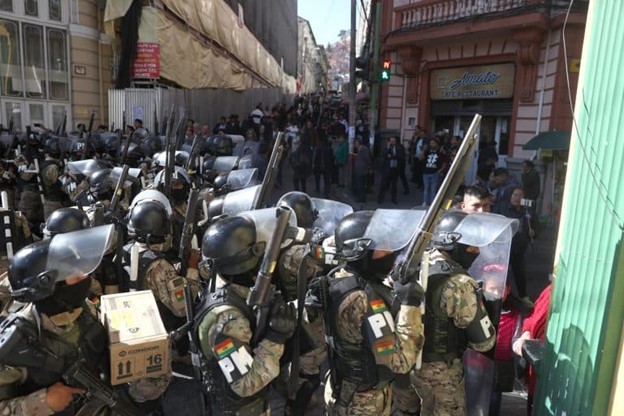
Despite its rapid failure, the military rebellion in Bolivia will have political consequences.
By Pablo Stefanoni* (Confidencial)
HAVANA TIMES – The tanks in Plaza Murillo ended up being somewhat of a farce that could have turned into a tragedy, in a political climate increasingly deteriorated by disputes within the Movement Towards Socialism (MAS), now fractured into two wings: supporters of former President Evo Morales and those supporting President Arce.
On the afternoon of Wednesday, June 26, the Army’s Chief Commander, Juan Jose Zuñiga — who had been dismissed on Tuesday night but refused to acknowledge the presidential decision — occupied that emblematic square with armored vehicles. He even used one of them to forcibly open the doors of the Palacio Quemado, the former government headquarters now shared with the adjacent Casa Grande del Pueblo. Confusion about intentions and strategies prevailed throughout most of the uprising, while several government ministers placed furniture to prevent the entry of the uniformed personnel.
Tensions had escalated after General Zuñiga referred to former President Evo Morales’ inability to run for presidential elections again and responded to several of his accusations by calling him a “mythomaniac.” In an interview with the local program “No Mentirás” on June 24, the military chief stated, “Legally, Evo Morales is disqualified. The Constitution says that there can’t be more than two terms, and this gentleman was re-elected. The Army and the Armed Forces have the mission to enforce and uphold the Constitution. This gentleman cannot be president of this country again.”
Zuñiga was referring to a controversial ruling by the Plurinational Constitutional Court which, in a sentence on another matter, included a forced interpretation of the 2009 Constitution that would exclude the three-time president from the presidential race. The Constitution stipulates that only two consecutive terms are possible, but the court “interpreted” that it’s two terms in total — consecutive or not — which Morales presented as an attempt of political proscription by the “endogenous right,” within the framework of what he called a “dark plan” to remove him from the political field, orchestrated, according to him, by the ministers of Justice, Ivan Lima, and Government, Eduardo del Castillo.
Zuñiga’s threatening statements, appointed as Army Commander at the end of 2022 by President Luis Arce, angered the former president and Evo supporters, which began to speak of an impending “self-coup.” “The kind of threats made by the Army’s Chief Commander, Juan José Zúñiga, have never occurred in a democracy. If they are not disavowed by the Commander-in-Chief of the Armed Forces [Luis Arce], it will be proven that what they are really organizing is a self-coup,” Morales denounced on his X account, from where he daily criticizes the Arce government, which he considers a traitor to the so-called “Process of Change.”
But it wasn’t just the former president. Zúñiga’s threats violated military regulations and the Constitution, which explains Arce’s decision to dismiss him. However, the military chief considered this an expression of “contempt” despite his loyalty to the president. On Wednesday, June 26, as reported by El Deber newspaper, he was summoned to be formally relieved, but he arrived at Plaza Murillo with armored


